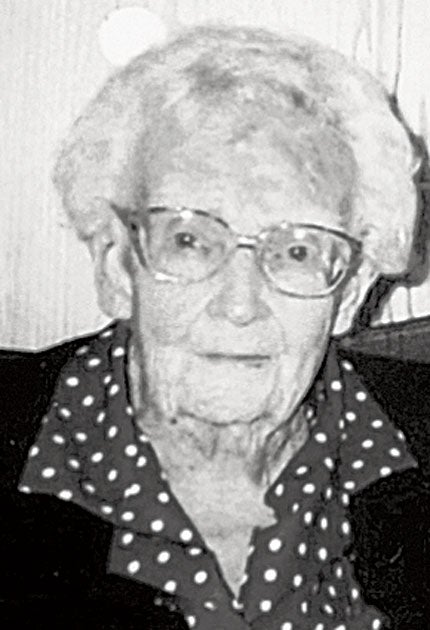Mary Baptie: Labour Party activist who campaigned for Manny Shinwell in 1918 and 1922

When I paid a visit to Mary Baptie on the morning of her 105th birthday party, clear as a bell she recalled the first General Election in which she participated – 1918, when as a 14-year-old she ran round the streets of Bo'ness delivering election leaflets for the unsuccessful Labour candidate, Emmanuel Shinwell.
Her father Robert Baptie, a highly skilled baker, and one of the founders of the Labour Party in West Lothian in the early 1900s, was secretary of the Bo'ness Labour Party (years later in 1962, he was a crucially important influence in getting me selected as a Labour candidate at a parliamentary by-election). Mary Baptie would speak of the times that Keir Hardie and other prominent socialist speakers would spend the night in the front room of their house after an evening meeting.
The Bapties particularly welcomed Ramsay MacDonald, whom they admired until Labour's disastrous performance in the general election of 1931.
Mary Baptie had a clear recollection of street-corner meetings in the 1922 General Election, when "Manny" was elected to Parliament. "But splendid orator though he was, we always thought Shinwell was a bit of a wide-boy," she told me. "We did not trust him. We were not surprised when he was defeated in 1924. He did not have to be so rude to so many people in West Lothian."
Baptie worked for him in the 1928 by-election, which he won, but was unsurprised by his defeat in 1931, by Sir Adrian Baille of Polkement House (a local estate) and Leeds Castle. Baptie scorned Shinwell's claim that if Linlithgowshire, as the constituency was then called, had not defeated him by a whisker, "I, and not that man Attlee would have been leader of the Labour Party."
Mary Baptie was perhaps the last living link with the infancy of the Labour Party. She was born in January 1904; it is 40 years since she retired after a life time of service to the primary school in Bo'ness, at which she herself had been a pupil.
In my opinion, there is no more important professional task than that of primary school teacher. They are a hope and influence in peoples' lives. As a secondary school teacher at Bo'ness Academy between 1956 and 1962, I am in a position to know how well-taught in maths (and other subjects) the pupils who had been in Miss Baptie's class were, and how well-respected her sharp but kindly discipline made her. She became loved by six generations.
Mary Jane Thom Scot Paterson Armstrong Baptie, political activist and teacher: born Linlithgow, 31 January 1904; died Bo'ness, West Lothian 9 October 2010.
Join our commenting forum
Join thought-provoking conversations, follow other Independent readers and see their replies
Comments
Bookmark popover
Removed from bookmarks